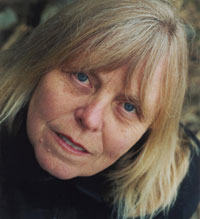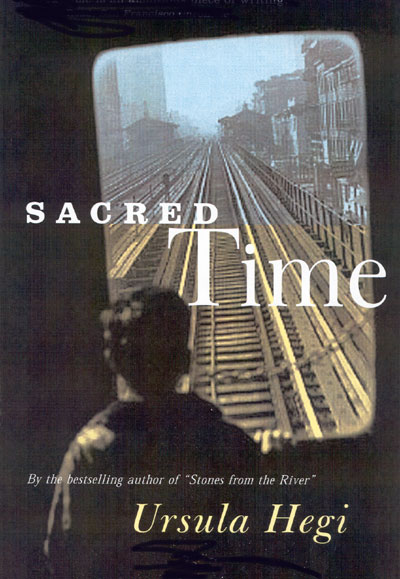 Ursula Hegi (credit: Gordon Gagliano) September 23, 2004 (Thursday) 8:00 p.m. Reading, Q&A, Signing Assembly Hall, Campus Center UAlbany, Uptown Campus |
 |

 Ursula Hegi (credit: Gordon Gagliano) September 23, 2004 (Thursday) 8:00 p.m. Reading, Q&A, Signing Assembly Hall, Campus Center UAlbany, Uptown Campus |
 |
Bestselling novelist Ursula Hegi was born and raised in postwar Dusseldorf, Germany, before emigrating to the U.S. as a teenager. She explores German and German-American identity in the 20th century in both her fiction and nonfiction.
Hegi's compelling 1994 novel, "Stones from the River," tells the story of a dwarf named Trudi who endeavors to hide and save Jews in a small German town during the Nazi Holocaust. Nominated for the PEN/Faulkner Award in 1994, the novel became a national bestseller in 1997 after being an Oprah's Book Club selection. The novel spent 21 weeks on the "New York Times" Bestseller List.
Suzanne Ruta, writing in the "New York Times," said, "This moving elegaic novel commands our compassion and respect for the wisdom and courage to be found in unlikely places, in unlikely times." The "Columbus Dispatch" reviewer said that the book "carries the reader through a deliciously rich plot that cascades from cover to cover."
Hegi's newest novel is "Sacred Time" (2004), the story of a troubled Italian-American family living in the Bronx. Anthony Amedeo is a lonely 7-year-old boy who must share a bedroom with his twin cousins Belinda and Bianca, after their father goes to jail for theft. One night in 1953, Anthony commits an unthinkable act that will haunt him and his family for 50 years, over the course of three generations.
The "Los Angeles Times" reviewer said, "With her latest novel, Ursula Hegi affirms the story-telling gifts so famously on display in her bestselling novel, 'Stones from the River.'" The "San Francisco Chronicle" said, "the desire to see this family put its demons to rest propels the reader onward to its dark conclusion."
Hegi's other books include the novels, "The Vision of Emma Blau" (2000), "Salt Dancers" (1995), "Floating in My Mother's Palm" (1990), and "Intrusions" (1981).
"The Vision of Emma Blau" tells the epic story of a family of German immigrants who arrive in the United States in the late 19th century. "Publishers Weekly" said that "Hegi creates a social world in microcosm, and, following her characters for almost a century, fashions a saga of hidden loves and destructive obsessions."
"Salt Dancers" is the disturbing story of a woman in her forties, a survivor of child abuse, who confronts her father in an effort to understand--and escape the consequences of--her childhood injury. The "Booklist" reviewer said, "In achingly beautiful prose that exacts a huge emotional toll, the author at once shatters and rebuilds the myth of the family unit."
"Floating in My Mother's Palm" is a loosely autobiographical tale about growing up in the first decades after World War II in a small German town- the same town that would provide the setting for Hegi's subsequent bestseller, "Stones from the River." The interwoven lives of Hegi's characters "glow with the luminosity of Impressionist paintings," said "Publishers Weekly."
Hegi's nonfiction book, "Tearing the Silence: Being German in America" (1997), is a unique and powerful oral history, composed of conversations with German-born Americans who, like Hegi herself, spent their youth in postwar Germany before coming to the U.S. The interviewees, all of them protected by pseudonyms, confront their own divided cultural identities, the silence of their parents, and principally the issue of German guilt for the Holocaust, in various ways. Some of Hegi's interviewees are residents of the Capital Region.
The "Cleveland Plain Dealer" said that Hegi's book "does more than tear; it rips open a Pandora's box of Germans' emotions about the Holocaust and World War II--guilt, pain, anger, confusion, freedom and betrayal�. [The interviews] are personal, cathartic and deeply revealing."
| Writers Online Magazine Article Times Union Article |